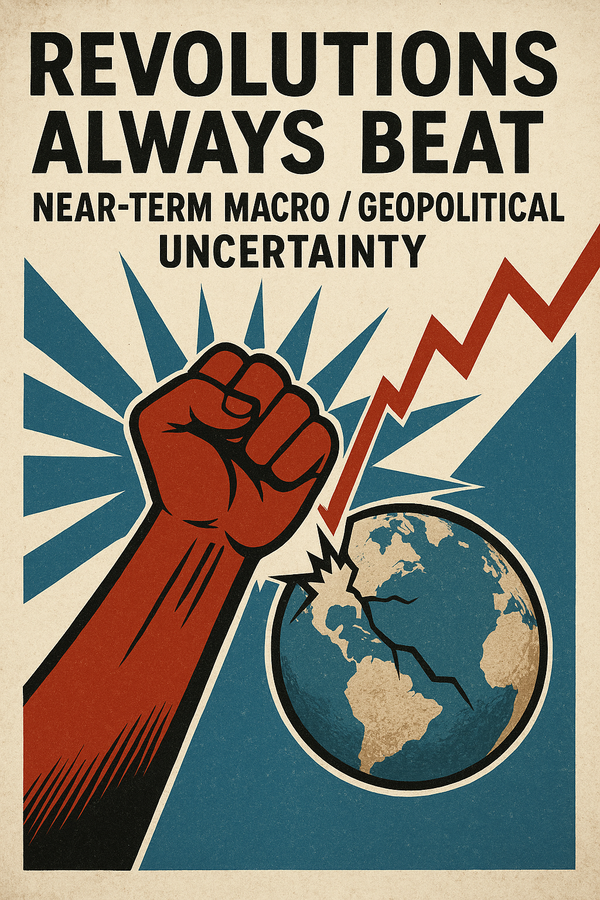I wanted to share the analysis of three…
Since I published 50 Stocks for the App Revolution back in November and gave the $79 report in its entirety to you subscribers, the stocks in the report have more than doubled the mid-single digit returns of the broader markets. The App Revolution is kicking in and I wanted to go through each and every name in the report to update our analysis. We’re about halfway through with updated report so stay tuned for more samples from it in coming weeks as it gets published, but in the meantime, I wanted to share the analysis of three of our Revolution Investing model portfolio positions, Google, Apple and Microsoft. Enjoy and see you next week.CompanyGOOG – Google, Inc.SummaryHaving joined the modern lexicon as a verb (when was the last time you “Yahoo’d” something?), Google is enjoying success in making its mobile platform, Android, as ubiquitious.Balance SheetCash and Cash Equivalents: 12 BShort Term Investments: 24 BLong term Investments: 666 MTotal Cash: 37 BTotal Debt: –0Net Cash: 37 BOutstanding Shares: 322 MNet Cash / Share: 113.81Share Price: 528Enterprise Value / Share: 428Total Market Cap: 170 BEnterprise Value: 138 B2012 Sales Growth: 20.4%2012 Earnings Estimate: 39.54Enterprise Value Multiple: 11 Times Forward EarningsDividend & Yield: N/AIn a few short years, Google’s Android has gone from a nascent technology to full-blownstandard. Turn on the TV and you’ll see the wireless carriers touting their Android offeringsin the way they used to talk about Blackberry and Palm. And despite Apple’s rabid fan base,Google has basically pulled even with the iPhone’s operating system in terms of market share.While the Apple experience is tightly controlled and exists on one phone, Google has decided tomake Android as agnostic as possible, allowing developers and phone manufacturers to tweak asthey see fit.All of this is Google’s way to extend its strangehold on search into the Brave New World thatis mobile consumption. Google wants its search to be the first thing you think of when youdon’t know something, and increasingly that need-to-know is being fulfilled on smartphones.Google is building on the momentum of search and Gmail to offer mobile consumers Apps foreverything from digitized medical records to paying with your cellphone for gas. The veritablewar between Google and Apple (and everyone else- Blackberry, Palm and Nokia) is for theundivided attention of a consumer on the go, that want to consume on their schedule. And itshard to picture a world where consumers don’t want Google to be a part of their lives.And lucky for you, Mr. Market seems unconcerned with Google’s spectactular growth andpotential for new multi-billion dollar revenue streams. The stock now trades at around 11-timesnext year’s earnings and has around $113 a share in cash. With $37 billion in cash (a stockpilethat could easily hit $100 billion in three years) and a 15% growth with huge margins, Googlecould end up the first trillion dollar company—a $2000 price tag for those of you keeping score.Revolution Investing rating: 9/10====CompanyAAPL – Apple, Inc.SummaryApple makes computers, mobiles devices, digital music players and all kinds of devices that runconnect with the Internet.Apple’s hardware line is highly coveted for its design and and are bar-none the best userexperience for all things internet-consumption.Balance SheetCash and Cash Equivalents: 16 BShort Term Investments: 13 BLong term Investments: 37 BTotal Cash: 66 BTotal Debt: –0Net Cash: 66 BOutstanding Shares: 925 MNet Cash / Share: 71Share Price: 346Enterprise Value / Share: 314Total Market Cap: 320 BEnterprise Value: 290 B2012 Sales Growth: 20.8 %2012 Earnings Estimate: 28.63Enterprise Value Multiple: 11 Times Forward EarningsDividend & Yield: N/ABuilding a better tablet experience than the iPad is proving to be much like building a bettermousetrap—not so simple. Steve Jobs confidently predicted in October 2010 that 7 inchcompetitor to the 10 inch ipad would be “DOA”. Less than a year later, Acer cried Uncleand killed it’s 7 inch efforts. Even companies that have rolled out (relatively) well-reviewedtablets haven’t been able approach the ipad’s halo either on price (Motorola’s Xoom) or price(Blackberry’s Playbook).Just witness the frenzy that the ipad has inspired on the content side. Major cable companies,Netflix and HBO have all released apps that let users watch content on demand. With DVD andBlu-Ray sales falling off a cliff, content producers/deliverers are finalizing wising up and givingconsumers what they want—and Apple is where they want what they want.The biggest change to Apple’s business model is being rolled out this year with the launch ofiCloud. Details are still fuzzy but they run along the lines of a digital file locker from whichconsumers can access their movies and music—a cloud based iTunes. In 2003 I cautionedagainst talk that Apple would buy Universal Records for $6 billion, but would instead buildout its agnostic music service offerings. And as the labels have withered, they are now morethan happy to offer up their catalogs for Apple to stream to it enormous customer base—for therelative pittance of $150 million. While Google and Amazon have tried to pre-empt Apple inthis area with little traction, Jobs & Co is still the 800-lb gorilla when it comes knowing whatconsumers want.Apple knows its strength and presses its advantage to the edge. It’s transformed its supply chaininto a nimble factory-to-door experience for buyers. The cycle on which Apple pays vendorshas become so efficient and compressed that it’s juicing the company’s earnings. And it’s per-square-foot sales are the envy of the retail industry.The numbers have been dizzying and Wall Street’s parlor game of figuring out Apple’s growthhas been in an ever-upward trend. Apple ships around 360,000 iOS devices (ipad, ipod touchand iphone) a day. Sitting on about $66 billion of cash and zero long term debt must be somekind of corporate record, and Apple is unlikely to fritter it away like behomeths of the past (see:Occidental Petroleum buying Iowa Beef). The focus of Apple means they will continue to plowmoney into vendor financing and boosting it’s own supply pipeline instead of looking to expandwhat it does. In the months after the ipad 2 launch, Apple worked dilligently to ease bottlenecksin supply and is now better Apple to deliver its tablet to seemingly insatiable demand. Every newApple product launch is still front page news. What other company has its customers payingpeople to camp out for a new release?. And then when you consider that the fastest growingdevice company of all time (20-30% for the better part of a decade) can bought for 11 timesforward earnings, Apple starts to look a superb value investment.Revolution Investing rating: 9/10=====CompanyMSFT – Microsoft CorporationSummaryMicrosoft develops, manufactures, and sells a wide range of software products for computers andmobile devices.Balance SheetCash and Cash Equivalents: 7 BShort Term Investments: 43 BLong term Investments: 10.8 BTotal Cash: 60.8 BTotal Debt: 11.9 BNet Cash: 48.9 BOutstanding Shares: 8.4 BNet Cash / Share: 5.8Share Price: 24Enterprise Value / Share: 20.2Total Market Cap: 204 BEnterprise Value: 170.5 B2012 Sales Growth: 6.50%2012 Earnings Estimate: 2.77Enterprise Value Multiple: 6 Times Forward EarningsDividend & Yield: .64 (2.6 %)When Mark Twain said that reports of his death were highly exaggerated, he could have beentalking about Microsoft. The narrative out of Wall Street writing off King Softee has been inplace for at least the last 10 years. Meanwhile no one seems to notice that Microsoft more thandoubled its topline and bottom line since 2001–no small feat since its revenue base was already$25 billion. Despite the growth, Microsoft’s stock is off 30% in the last decade.As far-flung as its focus can seem at times, Microsoft has essentially been placing small betsrealtive to it’s size, that it hopes can blossom into full blown product lines. Just look at Kinect,the companion to its Xbox gaming console. For years Microsoft has lost money in on each Xboxsold, but with Kinect it has a full-fledged hit, one that juiced Q1 revenues at its Entertainmentdivision to the tune of 55%. Few companies have Microsoft’s wherewithal to hold out for adecade to while a product base is installed.And for all the talk of Google giving away free software that Microsofts’s enterprise customerspay for, nothing of the sort will happen over night. The recurring revenue model is very muchin place and Microsoft will keep offering new enterprise products that are pipelines into theircustomer’s walletsYou can deride Softee for Bing or Zune (and you know that I have), but a scenario whereMicrosoft is #2 or #3 in any one of a several new multibillion dollar industries isn’t farfetched.Microsoft may not beat out Google initially at display advertising for example, but the $10billion market is too big for advertisers to hand over to just one company. Not chump changeand as the overall market grows, Softee is positions to grow with it.The US might lose its AAA rating before ever Microsoft does—its cash hoard stands at $50billion and climbing. You rarely get to buy a big company with so many new potential sourcesof revenue so cheaply. When CEO Steve Balmer recently complained about Asian piracy, henoted that the market was around the size of the US and growing spectactularly. While I don’texpect the culture of a China to change over night, this is illustrative of Microsoft’s potential,that just sweeping up the crumbs could be a pretty good meal on its own. Balmer’s relativelyearly stake in Facebook is conservatively a three bagger and the Skype acquisition can fit in withabout a half-dozen existing product lines. Overcoming piracy, mobile phones, gaming, you areessentially buying call options on Microsoft executing on any one of these fronts by getting longthe stock at 6 times next years extremely reliable earnings.Revolution Investing rating: 8/10




